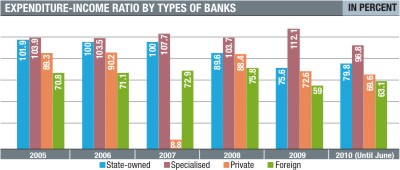Banks scale down costs
 Sajjadur Rahman
Sajjadur Rahman
Management efficiency, use of technology and reduction in bad loans helped banks minimise their operating costs in the past decade.
Private banks and foreign commercial banks operating here were more efficient in managing their expenditure than the state-owned commercial and specialised banks, a central bank report shows.
The report found that a Private bank spent 93.1 percent of its income in 2003. Such expenditure was 69.6 percent in June 2010, down by over 25 percent between the periods.
The foreign banks have minimised the costs by 21 percent, state-commercial by 19 percent and specialised banks by only 4 percent between 2003 and 2010, according to the draft annual report of Bangladesh Bank (BB).
The cost-income ratio is a key financial measure, particularly for valuing a bank. It shows a bank's expenditure in relation to its income. It is useful to measure how costs are changing compared to income -- for example, if a bank's interest income is rising but costs are going up at a higher rate, it may not be good for the bank.
The Bangladeshi banks have long been blamed for poor efficiency, which pushed their costs up. It also increases the borrowing costs.
Bankers credited young professionals, use of technology and declining bad loans for a significant fall in costs in the just-concluded decade.
“Young generations are bright and their productivity is higher than their older colleagues,” said Shahjahan Bhuiyan, managing director of United Commercial Bank, who has nearly four decades of experiences in the banking industry.
Bhuiyan also attributed the success to the falling non-performing loans (NPL).
BB data shows that the average NPL for the banking sector was 17.6 percent of their total loans in 2004, which came down to 8.7 percent at the end of June 2010. The private and foreign banks are the best performers in terms of controlling bad loans with only 3.7 percent and 2.4 percent respectively as of June 2010. The NPL was nearly 23 percent for the state banks.
“The banks are heavily investing in technology, which ultimately helps us with efficiency enhancement and managing the costs,” said Anis A Khan, managing director and chief executive officer of Mutual Trust Bank.
According to Khan, the main reason behind the fall in the expenditure-income ratio was a tremendous growth in the banks' profit.
sajjad@thedailystar.net Source: The Daily Star/ Bangladesh/ Jan-7-2011




Comments